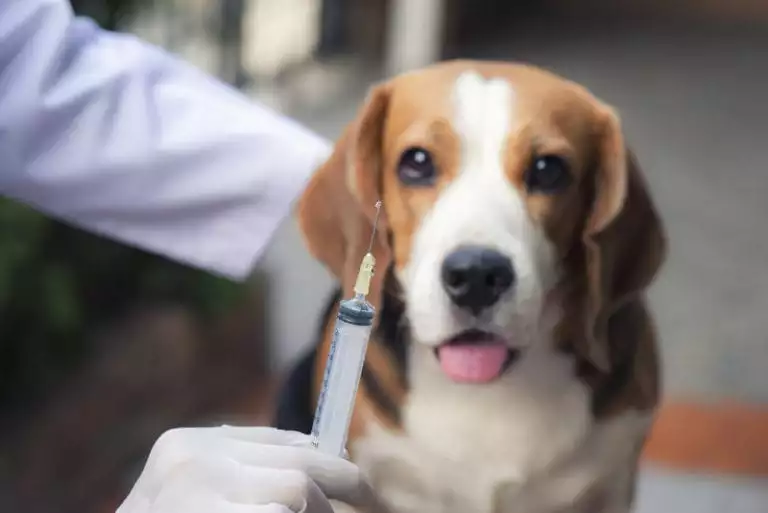You probably hear a lot about how important vaccinations are to your pet’s health, but part of you wonders if they’re all really necessary. Well, the truth is that every pet is unique and it’s up to you and your veterinarian to decide which vaccines are truly essential for keeping your pet safe and healthy. Your pet’s vaccination schedule should start when they’re a puppy and then continue on an as-needed basis for the rest of their life.
So, why so many vaccines? And which vaccines does your pet really need?
Your Dog’s Vaccination Schedule
Why do dogs need so many shots? Puppies will start on a vaccination schedule soon after they’re weaned, usually between 6 and 8 weeks of age. They will continue to receive a series of vaccines every 3-4 weeks until about 16 weeks of age. The reason for the series is that it strengthens your puppy’s still-developing immune system and helps them better ward off disease. Distemper, hepatitis, parvovirus, and parainfluenza are all core vaccines given on this schedule in a combination vaccine, DHPP. The rabies vaccine is given to puppies at about 12 weeks of age and then again at 1 year of age.
In addition to these core vaccines, your veterinarian may also recommend one or more of the following “lifestyle” vaccines based of your pet’s exposure to risk:
- Leptospirosis
- Lyme disease
- Bordetella (“kennel cough”)
- Canine influenza
After your puppy’s initial series of vaccines, your adult dog will continue to receive boosters throughout their life.

Which Dog Vaccinations are Most Important?
An adventure hound who often accompanies you on outdoor adventures will require different vaccines from a cuddly indoor-only lap dog! Both will receive core vaccines, yet the more adventurous one will likely need a few more.
Core Vaccines Recommended for All Dogs
- Rabies – The rabies vaccine for dogs is required by law in the state of Indiana, and is given to puppies at about 12 to 16 weeks of age. This disease is fatal once symptoms develop and it is zoonotic, meaning it is easily transmissible between species—including your human family.
- Distemper – Canine distemper is a highly contagious disease that is especially threatening to young puppies, older dogs, and those with underlying health issues. There is no cure for distemper, but dogs can survive if given treatment for the symptoms and constant care.
- Parvovirus – Parvovirus is a deadly disease particularly to young puppies and senior dogs. A dog who has contracted parvo can spread the disease through its feces even after they have recovered from the illness. The parvo vaccine is the only way to truly prevent your dog from getting this dangerous disease.
- Hepatitis – Hepatitis is caused by the adenovirus, which is why you’ll sometimes see the combo vaccine DHPP written as DAPP. Hepatitis can cause severe liver damage that can result in hemorrhage and even death. It’s spread through the feces and urine of an infected dog.
- Parainfluenza – Parainfluenza is very contagious and can cause a number of flu-like symptoms in your pet such as cough, fever, difficulty breathing, and runny nose, and eyes.
Lifestyle Vaccines Recommended on an Individual Basis
- Bordetella – Bordetella is a bacterial infection that causes “kennel cough” due to the damage the bacteria causes to the dog’s trachea. It is spread very easily between dogs who share the same water bowl, toys, crates, or even walking areas. Other symptoms include fever, nasal discharge, sneezing, and loss of appetite. If left untreated, the disease could cause a secondary bacterial infection or pneumonia. If your dog is boarded often or in close proximity to other dogs, we may recommend this vaccine.
- Leptospirosis – Leptospirosis is a bacterial infection that is spread through the urine of an infected animal. Leptospira bacteria thrive in the water and can also contaminate the soil. They can even be found in an owner’s backyard given the fact that rodents have access to this area and can shed it there. If your dog is often in wildlife areas where Leptospira may be present, we’ll recommend this vaccine.
- Lyme disease – The Lyme vaccine for dogs protects them against the tick-borne illness, Lyme disease. In Northwest Indiana, black-legged ticks who are known to spread the disease are prevalent in certain areas, including the dunes and the lakeshore. If your dog often hikes with you in these areas, this disease can help add a layer of safety to these excursions.
- Canine influenza – Canine influenza is easily spread between dogs and causes flu-like symptoms. If your dog is often in social situations with other dogs such as at a dog park, daycare, or other dog-social events, the canine flu vaccine may be recommended.
Interested in learning more about dog vaccinations and which one your pet needs to stay healthy? Bring your pet to Coyne Veterinary Center in Crown Point, IN!




